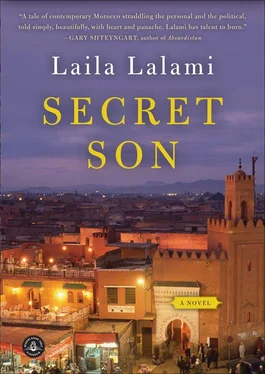The worst of it, of course, was that when they finally managed to reach Amal, she did not show any remorse, nor did she have the wisdom to deny the relationship. Nabil could have said he believed her, even though he didn’t, and the matter would have been closed. But his daughter had never been the deceiving type. She readily admitted that she was dating an American, a photography student. Naturally, Nabil had to do what any sane father in his position would have done: He fumed, he yelled, he threatened. Then he hung up.
Malika wanted to get on a flight to Los Angeles immediately, to talk some sense into Amal, but Nabil forbade her categorically. It was up to Amal to apologize. The days wore on, their stay in Paris ended, and still she did not call. When they returned to Casablanca, Nabil told his bank to stop automatic transfers to Amal’s account in Los Angeles. His reasoning was simple. Amal claimed that she was old enough to make her own decisions, and if she was old enough for that, then surely she was old enough to pay for her own studies. Malika, of course, was furious. She called him morning and evening to argue that he should “stop the nonsense,” that he needed to “get on with the times.”
Nabil knew better, though. If he let Amal get away with this, then what next? She might get the idea that she could marry an American. Whom had he been working for all this time? And to whom would he leave his share of the business? Some foreigner who would take her away to his country, away from her family, her home, her homeland? A few lean weeks would convince Amal of her mistake, and she would fly back home and ask for his forgiveness.
But Malika did not — or refused to — understand. She said that their nephews, Tahar’s son and Othman’s son, were dating American girls while studying in New York, without the slightest risk of being cut off. But it is not the same, Nabil wanted to scream. They are young men, and that is what young mendo. Of course, none of this would be an issue if Amal had been a boy. Things would have been so much easier for him if she had. When Malika was pregnant with Amal, he had not been concerned about the baby’s sex at all. They had their whole lives ahead of them. Even during Malika’s second pregnancy, he had not cared whether the baby was a boy or a girl. But after four miscarriages, after the doctors said that he and Malika needed to stop trying, that her uterus would not carry another baby to term, he had caught himself wishing that Amal had been a boy. By then she was already six years old, still just a baby, but the realization that she would be his only child had changed everything. He had pushed her, yes, but she always did well under pressure. She outscored her cousins on all the standardized tests, loved to read, spoke fluent Spanish, played a mean game of tennis, shared his love of Laabi’s poetry and his passion for Andalusian music. She was his prize. He would not lose her to some American.
Nabil’s secretary Fadila buzzed him again. A young man downstairs was refusing to leave, she said, even though he had been told that Mr. Amrani was too busy to see him. “What’s his name?”
“Youssef El Mekki.”
Nabil thought for a moment, running the name through his memory. “I don’t know him.”
“Sir, he says that you know his mother.”
Nabil sighed; he knew where this was going. These days, young people were getting pushier, coming up with all sorts of strategies to find a job, even if they had to shame you into offering them one. On his last trip to Rabat, he had seen the famous sit-ins in front of Parliament. Every day, a couple of hundred young men and women stood under the palm trees across the street, waiting for the representatives to come out so they could hassle them for a solution to their “situation.” Nabil’s leftist days were not that many years behind him, and he still prided himself on having a liberal fiber, but when he saw those young people in front of Parliament, he could not help but wonder: Did they seriously expect that jobs would be handed to them? And how effective was it, anyhow, pestering MPs like that? How different this generation was from his — thirty years ago, opportunity was to be taken, not asked for like a favor or demanded like a right.
And now, this Youssef fulan. Nabil figured he had to be one of the desperate ones, the kind that staged showy stunts to get attention. Just the other day, Nabil had heard a young man on the radio turn a request for a pop song into a plea for a job, hastily giving out his mobile number before the DJ cut him off. Nabil felt terrible for these young people, but he could not talk to just anyone who stalked him in the lobby. Imagine how many would follow. “Have security escort him out,” he ordered.
Now he dialed his home number. Before he could hear one ring at the other end of the line, Malika had picked up. “What are you going to do?” she asked.
This was how their arguments always started. She wanted him to do things, she simply could not stand by and let things be . She had no patience — and why should she, when she always got what she wanted? Nabil deferred to her on most decisions, but when his honor was at stake, she had no voix au chapitre . “Nothing,” he said. “Just give her some time to think about what she’s done.”
“I already spoke to her this morning.”
“What?” He felt like smashing the receiver against the desk. A set of silver-framed family photographs stared back at him. Suddenly they seemed to him testaments of a historical era, a bygone time when his wife and daughter still had love and respect for him, rather than the contempt they seemed bent on showing him now. He had fallen into disgrace: a man whose wife disobeyed him and whose daughter made a fool of him. He had to exercise all his self-control not to scream — the two secretaries might hear him. “I told you that I would deal with her,” he said between clenched teeth.
“She’s my daughter.”
“So what? This is for her own good.”
“Do you want me to tell you what she said or not?”
“What could she say?” Nabil said, raising his voice despite himself. “What could she have to say for herself?”
There was a long silence on the other end of the line. “You two are so alike,” Malika said with a sigh.
“What do you mean?”
“You’re both so stubborn. She said if you weren’t going to send her money, she’d do it on her own.”
Nabil chuckled. “This I’d like to see, Malika. How is she going to pay for college?”
“I don’t know. But if you don’t call her, she might do something drastic.”
“Like what?”
“I don’t know. Use your imagination. She could marry the boyfriend. Have you thought about that?”
“Of course I’ve thought about it. Don’t worry; it won’t come down to that. I have a plan,” he said. But he did not, simply because he had not expected Amal to call his bluff. He muttered something about having to get back to work and hung up. He dropped his head in his hands. How dare she? And for whom? For some useless boyfriend? Because that’s what it was — he was sure of it. He was sure it was nothing but defiance. If she had really cared for the young man, she would have called and tried to work something out, apologized, asked that they meet him. Or if she had not cared for the young man at all, she would have prevented her father from finding out. Other girls would have been more discreet about their relations, then gotten a doctor to sew them back up. But his daughter had made a declaration. It was his turn to respond, and at least he had responded in the proper way.
He scratched his chin, even though he had shaved in the morning and his skin was smooth. Maybe Malika was right. The only reasonable thing to do was to book a flight to Los Angeles and sort it out himself. He would have to invent some excuse for why he was visiting Amal in the middle of May, out of the blue. But it wouldn’t do any good, because she could still go back to seeing the young man after he left. On the other hand, if he brought her back home to Casablanca, something might transpire. People would ask why she had returned home before finishing her degree. And if anyone found out about what she had done, he would be the one shamed. He would have cried had he not thought it unseemly for a man to let himself go. The loud, hostile buzz of the interoffice phone startled him. “What now?” he barked.
Читать дальше












